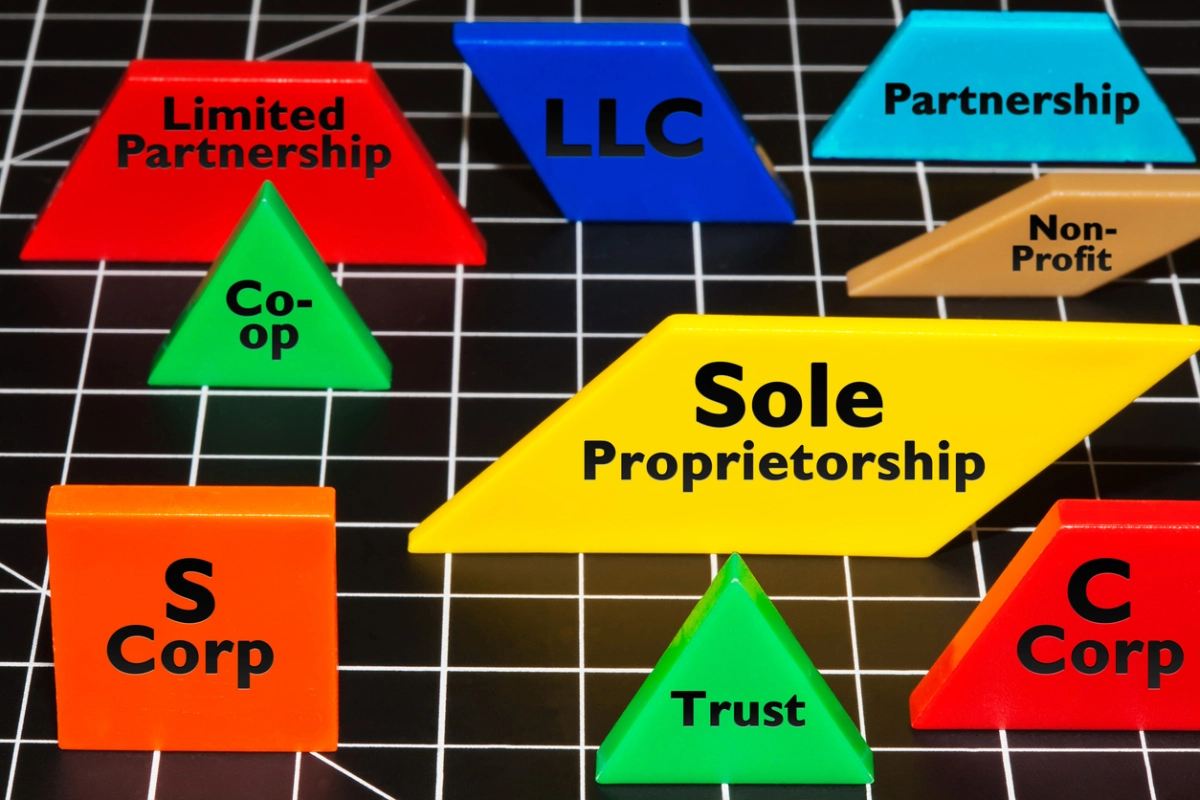
Selecting the right business structure—whether an LLC or a Corporation—is a critical first step that sets the foundation for your business’s success. This choice will impact everything from your liability protection and tax obligations to how you manage your operations and attract investors. An LLC or Limited Liability Company offers flexibility and shields your assets, making it a great choice for small business owners, while a Corporation provides a more structured setup ideal for those looking to scale and raise capital. However, there are nuances to each option that can affect compliance, taxes, and even long-term growth.
That’s why we’ve put together an Essential Checklist for Starting an LLC or Corporation—to guide you through every step of the process and highlight the critical decisions that can make or break your business. Keep reading to uncover the key steps you need to take to protect your business, optimize your tax strategy, and ensure compliance. Don’t leave your business’s future to chance; let our expertise guide you through the complexities and help you start on the right foot.
Types of Business Structures
Each business structure offers unique advantages that can align with different business types, industries, and long-term goals. Choosing the right structure isn’t just about getting your business off the ground—it’s about setting the stage for sustainable growth, maximizing tax efficiency, and protecting your personal assets. Let’s take a closer look at how each business structure can fit your needs:
- Sole Proprietorship: A single-owner business where the owner has unlimited personal liability. This structure is the easiest to form and manage but offers no liability protection.
- Partnership: A multi-owner business where the partners share liability and decision-making authority. Partnerships can be general (shared liability) or limited (some partners have limited liability). Each partner is taxed individually on their share of profits.
- Limited Liability Company (LLC): An LLC is a hybrid entity that combines the liability protection of a corporation with the flexibility of a partnership. LLCs are popular among small businesses because they protect personal assets and offer pass-through taxation (profits are reported on owners’ personal tax returns).
- Corporations: Corporations are more formal entities that offer liability protection and can raise capital through stock sales. They exist as separate legal entities, with shareholders, a board of directors, and corporate officers. There are two main types: C Corporations (C Corp), which face double taxation, and S Corporations (S Corp), which avoid double taxation but have ownership restrictions.
Importance of a Business Structure
Choosing the right business structure impacts every aspect of your business, influencing everything from how you are taxed, to the legal protections available to you, to how you can scale your operations. This decision isn’t just a formality—it’s a strategic move that can have long-lasting consequences on your financial health, risk exposure, and overall success. You should:
- Defines Roles and Responsibilities: Establishing a formal structure clarifies roles, responsibilities, and decision-making authority within the organization. This will also be documented in the operating agreement and business filings during the business formation process. Agreements may vary significantly as they will be made according to specific business entities and based on numerous variables.
- Ensures Compliance: Each structure comes with unique compliance requirements. Corporations, for example, are required to hold annual meetings and maintain minutes, while LLCs have fewer formalities and annual requirements as a result of internal revenue code stipulations.
- Attracts Investors: Corporations are typically more appealing to investors due to their ability to issue shares, which makes them ideal for businesses seeking significant investment.
Choosing the Right Business Entity for Your Business
When selecting a business structure, consider these factors carefully, as each one plays a crucial role in shaping the future of your business. This choice is not just about how you start your business, but also about how you manage it, scale it, and eventually exit it. Here’s a deeper look at the key factors to consider:
- LLCs are ideal for small to medium-sized businesses that want liability protection, tax flexibility, and operational simplicity. While the tax flexibility may be higher the federal income taxes may also be higher.
- Corporations suit larger businesses or those planning to seek investment, as they offer structured governance and the ability to issue stock. They can be better for federal tax purposes.
- Sole Proprietorships are suitable for low-risk, single-owner businesses that don’t require liability protection. Sole Proprietorships or Sole Props, may not have multiple owners — they may have only one owner.
Example: A freelance graphic designer may prefer a sole proprietorship or single-member LLC, while a tech startup with growth ambitions might choose a S Corporation or C Corporation to attract investors.
Note: C-Corporations are often used when the business does not meet the rules to become an S Corporation either due to ownership interests or the rules and regulations as set forth by the Internal Revenue Service (IRS).
Once you’ve chosen your business structure, it’s time to lay the foundation. This includes picking a name, designating a registered agent, and filing your business formation documents at the state and federal levels.
Decide on a Business Name
Choosing a name is more than just branding—it’s a legal requirement. Here’s how to do it right:
- Uniqueness: Check that your chosen name is unique and not already in use in your state. Most states have online business name search tools to verify name availability. In California, the CA Secretary of State has a public portal anyone can use to search for existing businesses.
- Compliance: Ensure the name follows your state’s naming rules. For example, LLCs must include “LLC” or “Limited Liability Company,” while corporations don’t necessarily need to include “Corp” or “Incorporated.”
- Trademark Protection: Consider trademarking your business name with the U.S. Patent and Trademark Office (USPTO) to secure exclusive rights to the name nationally. This is a lengthy process that can take years but provides you with complete control of your intellectual property.
Pro Tip: Check for the availability of your business name as a domain name, as having a matching website domain can strengthen your brand identity.
Designate a Registered Agent
A registered agent is responsible for receiving legal documents, tax notices, and official correspondence on behalf of your business. Here’s what you need to know:
- Requirements: A registered agent must have a physical address in the state where your business is registered. P.O. boxes are typically not accepted.
- Options: You can designate yourself as the registered agent or hire a professional service. Using a registered agent service offers privacy and ensures prompt handling of time-sensitive documents.
Why It Matters: Choosing a reliable registered agent ensures you don’t miss important notices, such as lawsuit notifications or tax correspondence, which can have serious consequences.
File the Articles of Organization (LLC) or Articles of Incorporation (Corporation)
These are the official documents that create your business entity. Each state has its filing process, but here’s what you can generally expect:
- Articles of Organization (LLC): This document establishes your LLC’s name, registered agent, and member details. It’s filed with your state’s business registration office, typically the Secretary of State.
- Articles of Incorporation (Corporation): For corporations, this document specifies the company’s name, registered agent, and details about the company’s shares and board of directors.
- Filing Fees: Fees vary by state but generally range from $50 to $500. Some states also require annual fees or reports to maintain good standing.
Obtain Licenses and Permits
Depending on your business activities and location, you may need specific licenses or permits to operate legally.
- Types of Licenses: General business licenses, sales tax permits, health permits, and industry-specific licenses (e.g., for food service or professional services).
- Compliance: Check with your state and local government agencies to ensure you meet all licensing requirements. Non-compliance can lead to fines or suspension of business operations.
Example: A restaurant may need a food service permit, a liquor license, and a local business license to operate legally.

Setting up your business finances properly from the start is crucial for tracking income, managing expenses, and maintaining liability protection.
Creating a Business Bank Account
A separate business bank account is essential for distinguishing personal and business finances. Your business entity will first need the Employer Identification Number (EIN) from the IRS to open a business bank account.
- Benefits: Helps with accounting, simplifies tax preparation, and provides a clear audit trail. Business funds are kept in business checking or savings accounts allowing the business entity to save money while also allowing your Certified Public Accountant (CPA), Enrolled Agent (EA), or accountants to regularly categorize transactions and produce financial statements.
- Liability Protection: Keeping business and personal funds separate maintains the legal protection of an LLC or corporation by demonstrating that the business operates independently.
Why a Business Bank Account is Essential for Your Business
- Enhances Credibility: A business bank account presents a professional image to clients and suppliers.
- Streamlines Accounting: It simplifies record-keeping, making it easier to track revenue, expenses, and tax deductions.
- Protects Personal Assets: For LLCs and corporations, separating finances reinforces the limited liability protection provided by these structures.
Managing Your Business Finances
Establishing solid financial management practices is critical to the success and longevity of your business because it serves as the backbone of sustainable growth. Proper financial management goes beyond simply keeping your books balanced—it involves strategic planning, accurate forecasting, and diligent monitoring of cash flow to ensure that your business stays profitable and resilient, even in uncertain times. You should:
- Create a Budget: Outline your anticipated expenses and revenue to guide financial decisions and ensure you don’t overspend.
- Monitor Cash Flow: Regularly track your cash flow to avoid shortfalls and maintain sufficient funds to cover expenses.
- Hire a Bookkeeper or Accountant: Consider hiring a professional for day-to-day financial management and tax planning. This can save you time, reduce errors, and help you make informed financial decisions.
Example: A small e-commerce business may hire a bookkeeper to manage daily transactions, while an accountant can provide quarterly financial reports and tax advice.
Staying compliant with federal and state regulations is not just a box to check off—it’s essential for maintaining your business’s good standing and long-term success. Failure to comply with the various rules and reporting requirements can result in hefty fines, penalties, and even the dissolution of your business entity. Compliance includes everything from filing annual reports, maintaining updated business licenses, and adhering to tax deadlines to ensuring that your business meets industry-specific regulations.
For example, LLCs and Corporations are often required to file annual or biennial reports with their state to confirm that the business is still active and to update essential information like addresses or registered agents. Missing these filings can lead to administrative dissolution, which could disrupt your operations and damage your reputation. Additionally, businesses operating in multiple states may need to register as a “foreign” entity in each state, which involves additional paperwork and fees.
Moreover, federal regulations such as tax reporting, employee classifications, and privacy laws must be strictly followed to avoid audits or legal disputes. Ensuring compliance not only keeps your business in good standing but also builds trust with clients, partners, and investors. Ultimately, staying proactive with compliance helps protect your business, safeguards your assets, and ensures smooth operations.
Registering Your Business in Other States
If you plan to operate in multiple states, you may need to register as a foreign LLC or foreign corporation in each state.
- Process: File a Certificate of Authority or similar document with each state where you’ll conduct business. This includes paying filing fees and adhering to each state’s requirements.
- Compliance: Ensure compliance with all state-specific regulations, as failure to register can result in penalties or restrictions on doing business in that state.
Example: A consulting firm based in New York but serving clients in California would need to register as a foreign LLC in California.
Obtaining an Employer Identification Number (EIN)
An EIN, also known as a Federal Tax Identification Number, is issued by the IRS and serves as your business’s unique identifier.
- Purpose: Required for tax filings, hiring employees, and opening a business bank account.
- How to Apply: You can apply online through the IRS website. The process is free, and you usually receive the EIN immediately.
Filing Annual Reports and Updating Your LLC Information
Many states require LLCs and corporations to file annual reports to keep their business information current.
- Purpose: These reports provide updated details on business operations, registered agent information, and ownership.
- Compliance: Regularly file annual reports and update the state about any changes in business structure, address, or ownership. Non-compliance can lead to penalties or loss of good standing.

Understanding your tax obligations and maintaining accurate records is essential to avoid penalties and ensure financial health.
How Is an LLC or Corporation Taxed?
- LLCs: Typically taxed as pass-through entities, meaning profits and losses are reported on the owner’s tax returns. LLCs can elect to be taxed as a corporation (C Corp) or S Corporation, which may provide tax benefits depending on the business structure and goals.
- Corporations: C Corps are subject to corporate tax rates, and dividends are taxed at the personal level for shareholders, resulting in “double taxation.” S Corps avoids double taxation by passing income to shareholders’ returns.
Importance of Accounting for Your LLC or Corporation
Accurate accounting is essential for tax compliance and financial health:
- Tax Preparation: Proper accounting ensures you have complete records for tax filings, helping to minimize errors and potential penalties.
- Compliance: Accurate records are necessary for filing annual reports, paying business taxes, and adhering to state regulations.
- Hiring a Professional: Hiring an accountant or bookkeeper can help manage the complexities of business accounting, allowing you to focus on growth.
Tax Obligations for Your Business Entity
Both LLCs and corporations have specific tax requirements:
- LLC Owners: LLC owners may need to pay self-employment taxes on profits.
- Corporations: Corporate income tax rates vary, and corporations must file separate tax returns. S Corps has pass-through taxation, which may reduce the tax burden for some businesses.
- Sales and Use Tax: If you sell products, you may need to collect and remit sales tax to the state. Register for a sales tax ID if applicable.
Starting an LLC or corporation is a significant step in building a business, and following this checklist will help ensure you’re set up for success. From choosing a structure to staying compliant and managing taxes, taking the time to complete each step thoroughly can lay a strong foundation for your business.
Key Takeaways:
- Choose a structure that aligns with your goals, liability needs, and industry.
- Set up separate finances to maintain liability protection and simplify accounting.
- Stay compliant with state regulations to keep your business in good standing.
Pro Tip: Consult a business attorney or accountant to guide you through the formation process and help tailor a strategy that supports your business’s long-term success.
Starting a business is an exciting journey, and following these steps can help you build a solid foundation for growth and prosperity.



